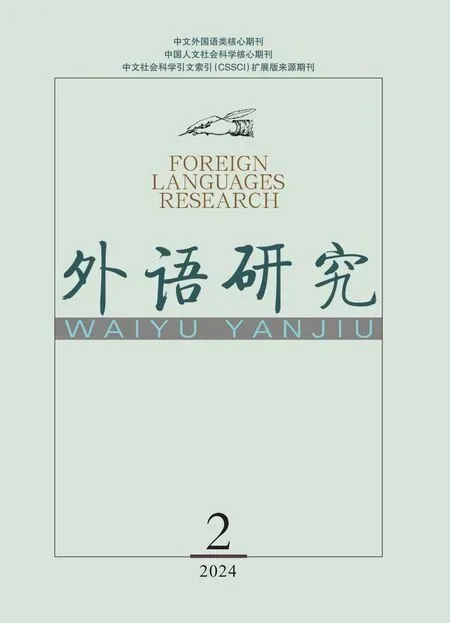本期英文摘要
2024-06-12
A Critical Analysis of Deliberate Metaphors in Political Cartoons on Energy Crisis: A Case Study of Health and Illness Multimodal Metaphor Scenarios
by ZHAO Xiufeng & WU Yuxin, p.1
Drawing on the deliberate metaphor theory,this study constructs a framework of critical metaphor scenario analysis,and takes the health and illness metaphors in political cartoons on the energy crisis for case analysis aiming at exploring how multimodal metonymy,metaphor and narrative dynamically interplay to represent conceptualizations about the crisis as well as the social actors involved, thereby deliberately conveying the social communicative purpose. The analysis reveals that three types of health and illness metaphor scenarios are recurrent: narcotic scenario, remedy scenario, and casualty scenario,respectively reflecting the strategy of attribution,reaction and proximization in terms of crisis rhetoric strategies, employed to satirize and criticize the EU’s insipient positioning, ridiculous reaction and disastrous consequences.In terms of cognitive mechanism,metaphors,metonymies as well as narrative elements such as roles and their relationships, actions and consequences in the scenarios are combined to place the energy crisis, a complicated geopolitical economic phenomenon, within individual life domain, targeting the distorted energy political relationships and cruel political game. Rooted in Western-centrism, these political cartoons deliberately demonize Russia, the EU’s dominant energy supplier,as the evil other,signifying the implicit manipulation of Western stereotypical way of thinking over the choice of metaphor and creation of the metaphorical scenarios.The present analysis, with elaborate illustration of the interaction among multimodal metonymies,deliberate metaphors,and narratives,contributes to multimodal cognitive integrated research and critical discourse analysis and provides a new perspective for the budding energy discourse study.
Key words:deliberate metaphor,multimodal metaphor,metaphor scenario,critical metaphor analysis,political cartoons,energy discourse
The Evolution Law and Research Prospect of Cognitive Linguistics Development
by RONG Zhenghao&WANG Shaohua, p.22
This paper aims to explore the evolution law, research prospect and development trends of Cognitive Linguistics.In the past 50 years, Cognitive Linguistics has developed in depth and interacted with other disciplines, and has been improving itself. The evolution of cognitive linguistics shows the following five features: its research scope has been expanded from theoretical establishment to theoretical perfection; its research method has been improved from the introspection of cognitive mechanism to the verification of neural mechanism with experimental evidences; its research perspective has been updated from the study of language and cognition to the multi-dimensional study of language,cognition, society and pragmatics; its research object has been diversified from a single cognitive discipline to the intersection of cognitive linguistics and other disciplines; the research dimension has been enriched from theoretical introduction and English studies to theoretical application, indigenization studies and Chinese studies. Not only has the theory of Cognitive Linguistics continuously been innovated in connotation, but a series of new disciplines or areas of interest have emerged as Cognitive Linguistics is embracing a widening interdisciplinary scope, which shows development trends of recontexulization of theory, interdisciplinary integration and indigenization studies, providing the multi-dimensional and appliable prospect.
Key words: Cognitive Linguistics, evolution law, integration, research prospect
A Research on the Structural Model and Influence Path of Non-English Major Postgraduates’Academic English Literacy
by LIANG Liwen, p.58
This study uses qualitative-quantitative-qualitative linear mixed design to explore the components of academic literacy of Chinese non-English major postgraduates,and analyze the influencing factors and the influencing path.The structural model of academic English literacy established in this study shows that the components include academic English knowledge,academic English skills and academic English capability.Factors affecting academic English literacy include academic English beliefs, academic English practice, academic English environment and English learning experiences. The impact path model combined with interview data shows that academic English beliefs have the most comprehensive impact. Academic English environment and practice complement each other, have a direct impact on academic English skills,and have both direct and indirect effects on academic English capability.Postgratuate students’English learning experience has a direct impact on academic English skills. Theoretically this study clarifies the relationship between the“common core”hypothesis and“socialization approach”of English academic literacy, and thus lays the theoretical foundation for integrating the above two theories to carry out academic English teaching for non-English major postgraduates in the Chinese context.
Key words: postgraduates, academic English literacy, structural model, influencing factors
